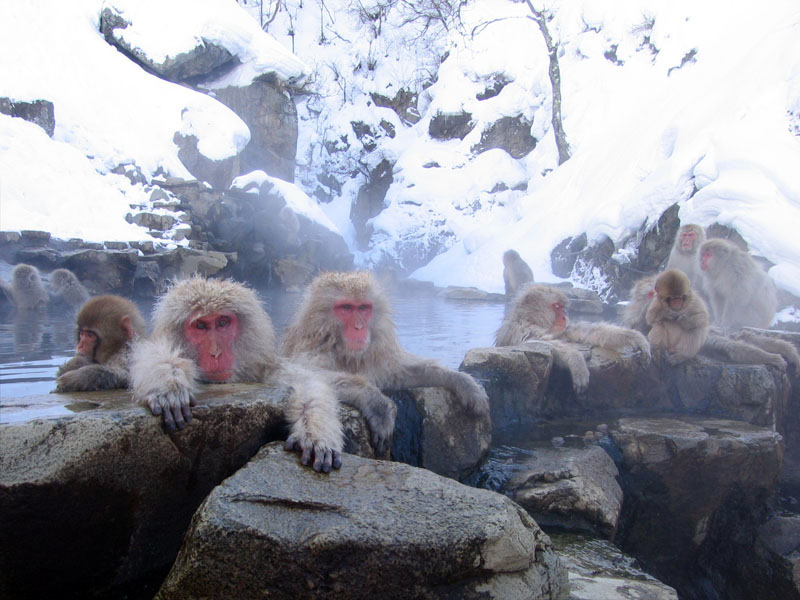こんにちは。
Quote:
Originally Posted by yumyumtimtam

I thought we could call you サルさん, but...サルmeans...(do you know the meaning?)
|
Ah, yes, I looked it up. Monkey! But it looks like when you use it for a person it might be more like "cheeky monkey", or something indicating a sly person. Is that correct?
Quote:
|
I like サル very much though!(I love any kind of animals)
|
Yes, I like サル too, especially orangutans and gorillas, although of course they are actually apes! But I see サル often means the Japanese Macaque. It's lovely to see them bathing in the hot springs surrounded by snow:

Quote:
『ゆりさん、SM教授!アイディアください』
Actually, I searched (should I say googled? but I didn't use google!) the word sarvodaya.
|
ヤムさん, people do say "googled" now, but obviously not when they don't use google! Also, here is a point of style. In English we tend to move meaning away from the verbs towards the nouns and adjectives, so that if there is a chance to use a simpler verb and a more complex nounal phrase, we will take it. So it might be more natural to say "I did a search" or even "I did a google search" although that sounds longer.
Quote:
I didn't know anything about it, but now I am very much interested!
Am I right to understand that "sarvodaya" means "the welfare/happiness of all" in Sri Lankan language?
|
Yes, that's right. It was a term used by Ghandi in his translation of a work from the 1860's by a chap called John Ruskin called "Unto This Last", which I'm currently reading. See wikipedia for more info:
Sarvodaya - Wikipedia, the free encyclopedia
Quote:
サルボダヤさん、sorry I didn't quite understand...this.
Did you mean that I like to ask you how you are?
|
I'm sorry. I completely misread this somehow. You were saying that you are also well!
That's right!
Quote:
|
I didn't know you call おにごっこ tig; I was told that it was called tag, but that's American way isn't it?
|
正解です!
Quote:
|
I didn't know this word "transliterate"; I only knew "translate".
|
When you convert from romaji to ひらがな or to カタカナ, or vice versa, you are transliterating. A transliteration is a representation of the same sounds in a different writing system.
Transliteration - Wikipedia, the free encyclopedia
I think this is "I am glad you say so", but I don't quite understand the role played by "くださって"? Forgive me!
どういたしまして
That's the way it is.
hrrm. Would this be something like: "Indeed, when speaking of instruction, it is never late"?
"I also think so"
"Indeed, the truth is that it was a dangerous situation."
どういたしまして!
Yes, I also think so.
Quote:
|
hoi polloi ! I went to Greece too!
|
Of course in English we say "the hoi polloi", which means, the the many! Aren't we silly!?
Quote:
No worries (do you use this in England too? I just came back from Australia 6days ago!) (do you use this in England too? I just came back from Australia 6days ago!)
|
Oh yes, we use that expression here. G'day; no worries, mate!
Quote:
|
I wrote some Japanese as you see but if you feel it's too much or too little, please let me know.
|
ありがとうございます。
Quote:
Thank you so much!
Im looking forward to tackling to your questions!
サルボダヤさん、また 質問(しつもん)が あります 。
|
"Sarvodaya, I have another question."
Quote:
I am not sure when to use "so", I mean Thank you "very" much or Thank you "so" much.
I was told not to say Thank you "so" much but "very" much (at an English school in Australia).
The teacher didn't explain why because at that time my English wasn't good enough to understand the complicated things.
|
You can say "Thank you so much". However, this too is a fairy colloquial expression. It is slightly more emphatic than "Thank you very much". It often appears alongside expressions such as "Oh, that's so helpful" or "That's so kind of you".
As you probably already know, the word "so" is usually used in a phrase like "he was so drunk that he couldn't find his way home" or "she was so polite that I couldn't possibly have thought ill of her". However, it doesn't always need a "that" clause to conclude. However, as I say, this use without an explicit "that" clause tends to be more colloquial, as in:
"He's such a strange fellow"
"James is such a talented violinist"
and
"Thanks so much!"
So, you can say "thank you very much" in a slightly more formal setting, or when writing a formal letter, but when speaking to a friend you can say "Thank you so much" to indicate an added closeness, emphasis and even slight excitement.
I hope this is clear; please let me know!
Quote:
Oh Im sorry, サルボダヤさ~ん! My story was too long wasn't it?
I do that... talking too much. That's my problem!
|
Not at all ヤムさん! I enjoyed reading it.
Quote:
Well, I think I should go to bed too, it's quarter to 3!
おやすみなさい m(_ _)m
|
ありがとうございます。
I hope you slept well.